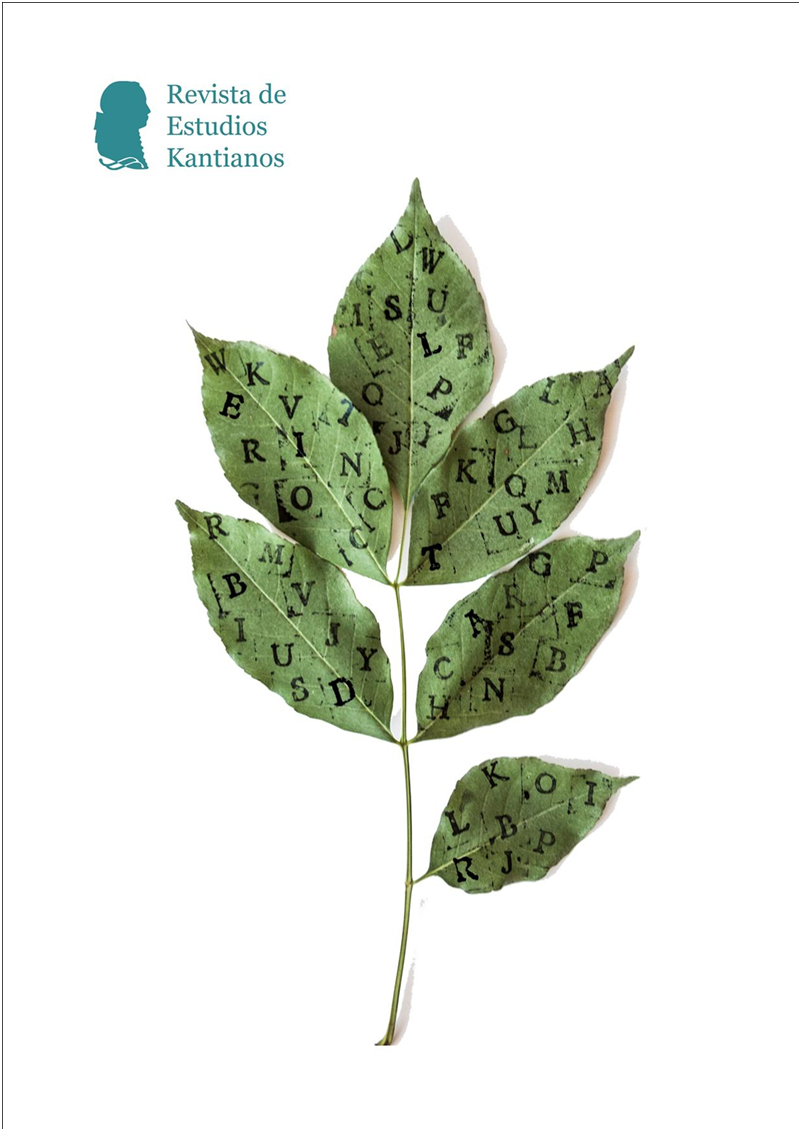On the Semantics of Kant’s Concept of Substance
DOI:
https://doi.org/10.7203/REK.9.1.28240Palabras clave:
substance, meaning, matter, ordinary objects, First Analogy of Experience Resumen
Resumen
This paper examines the debate about the referential meaning of Kant’s concept of substance. In the Critique of Pure Reason and other works such as the Metaphysical Foundations of Natural Science, the category or concept of substance appears quite uncontroversially to have both a logical meaning (by which it means roughly ‘a thing that is the ultimate subject of predication’) and an objective meaning (by which it means roughly ‘a thing that is permanent’, or, equivalently, ‘a thing existing at all times’). However, it is highly contested what kind of object, or objects, are supposed to meet, in experience, the criteria imposed by the conjunction of these two distinct meanings. I discuss two examples of the main interpretations to be found in the literature (Peter Strawson’s, 2000, who thinks that the reference of substance is only matter, and Claudia Jáuregui’s, 2021, who also counts ordinary particular objects as substances) and scrutinize their fit with some of the textual evidence, primarily from the First Analogy of Experience.
 Descargas
Descargas
 Citas
Citas
Allison, H. E. (2010). Kant’s Transcendental Idealism: An Interpretation and Defense. Yale University Press.
Ameriks, K. (2000). Kant and the Fate of Autonomy: Problems in the Appropriation of the Critical Philosophy. Cambridge University Press.
Aristotle (1938). Categories. On Interpretation. Prior Analytics. Harvard University Press.
Bennett, J. (2006). Kant's Analytic. Cambridge University Press.
Burke, M. B. (1996). Tibbles the cat: A modern “sophisma”. Philosophical Studies
Buroker, J. V. (2006). Kant’s Critique of Pure Reason: An Introduction. Cambridge University Press
Chisholm, R. M. (1973). Parts as Essential to Their Wholes. Review of Metaphysics.
van Cleve, J. (1999). Problems From Kant. Oxford University Press.
Guyer, P. (1987). Kant and the Claims of Knowledge. Cambridge University Press.
Hahmann, A. (2009). Kritische Metaphysik der Substanz: Kant im Widerspruch zu Leibniz. Walter de Gruyter.
Hahmann, A. (2010). Wozu braucht Kant die Kategorie der Substanz? Deutsche Zeitschrift für Philosophie.
Hall, B. (2011). A Dilemma for Kant's Theory of Substance. British Journal for the History of Philosophy.
Hanna, R. (2006). Kant, Science, and Human Nature. Oxford University Press.
Hume, D. (2000). A Treatise of Human Nature. Oxford University Press.
Jáuregui, C. (2021). Sobre la posibilidad de una interpretación monista de la Primera analogía de la experiencia. Revista Latinoamericana de Filosofía.
Kant, I. (1990-). Gesammelte Schriften. Akademie-Ausgabe.
Kant, I. (1992). Inaugural Dissertation. In Theoretical Philosophy 1755-1770. Cambridge University Press.
Kant, I. (1998). Critique of Pure Reason. Cambridge University Press.
Kant, I. (2012). Metaphysical Principles of Natural Science. Cambridge University Press.
Kemp Smith, N. (1923). A commentary to Kant’s ‘Critique of pure reason’. Macmillan.
Langton, R. (1998). Kantian Humility: Our Ignorance of Things in Themselves. Oxford University Press.
Loux, M. J. and Crisp, T. M. (2017). Metaphysics: A Contemporary Introduction. Routledge.
Melnick, A. (1973). Kant's Analogies of Experience. University of Chicago Press.
Nolan, J. P. (1979). Kant on Meaning: Two Studies. Kant Studien.
Oberst, M. (2015). Substanz. In Kant-Lexikon, ed. by Willaschek, Marcus; Stozenberg, Jürgen; Mohr, Georg; Bacin, Stefano. Walter de Gruyter.
Oberst, M. (2017). Kant über Substanzen in der Erscheinung. Kant Studien.
Oroño, M. (2022). Kant and the objective, logical and transcendental meaning of the categories. Estudos Kantianos.
Paton, H. J. (1936). Kant’s Metaphysic of Experience. Allen & Unwin.
Rosenberg, J. F. (2000). Identity and substance in Hume and Kant. Topoi.
Rosenberg, J. F. (2005). Accessing Kant: a relaxed introduction to the Critique of pure reason. Oxford University Press.
Sans, G. (2005). Wie viel Substanz braucht Kant? Revista Portuguesa de Filosofía
Strawson, P. F. (2000). Entity and Identity: And Other Essays. Oxford University Press.
Tetens, H. (2006). Kants ‘Kritik der reinen Vernunft’: ein systematischer Kommentar. Reclam.
Thöle, B. (2011) Die Analogien der Erfahrung. In Immanuel Kant: Kritik der reinen Vernunft. ed. by Mohr, Georg and Willaschek, Marcus. Akademie Verlag.
Descargas
Publicado
Cómo citar
-
Resumen96
-
PDF 29
Número
Sección
Licencia
![]()
Los autores que publican en esta revista están de acuerdo con los siguientes términos:
- Los autores conservan los derechos de autor y garantizan a la revista el derecho de ser la primera publicación del trabajo al igual que licenciado bajo una Creative Commons Attribution License que permite a otros compartir el trabajo con un reconocimiento de la autoría del trabajo y la publicación inicial en esta revista.
- Los autores pueden establecer por separado acuerdos adicionales para la distribución no exclusiva de la versión de la obra publicada en la revista (por ejemplo, situarlo en un repositorio institucional o publicarlo en un libro), con un reconocimiento de su publicación inicial en esta revista.
- Se permite y se anima a los autores a difundir sus trabajos electrónicamente (por ejemplo, en repositorios institucionales o en su propio sitio web) antes y durante el proceso de envío, ya que puede dar lugar a intercambios productivos, así como a una citación más temprana y mayor de los trabajos publicados (Véase The Effect of Open Access) (en inglés).








